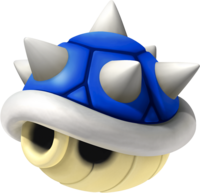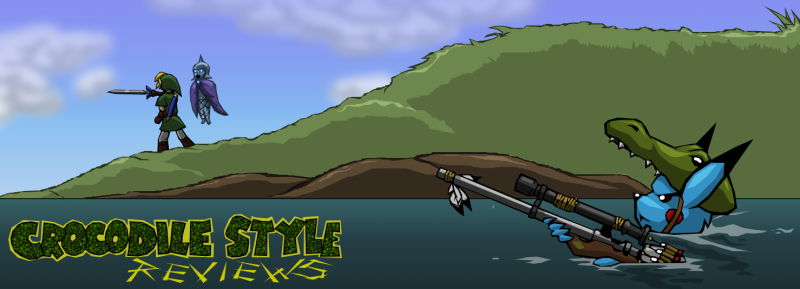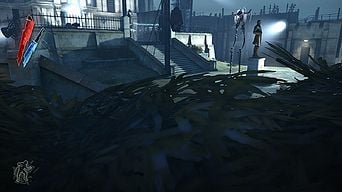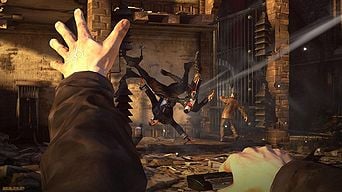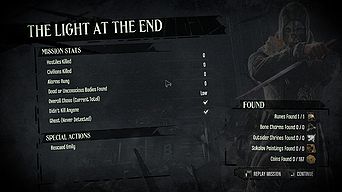Director's Notes
Go away, I'm tired. I'm not dragging this out, so I'll say that Nabber (talk) resigned from his Mario reviews section due to his busy schedule and Hurricane Sandy, but he may be back sometime in the future. Marioguy1 (talk) has also resigned from Character Reviews on the count of his extremely busy schedule, so best of luck to both of them.
Critic Corner Section of the Month
Last month saw a three-way tie! I'm too tired to sarcastically care that no one likes my sections, so I'll just be professional and congratulate YoshiMonsta (talk), Marshal Dan Troop (talk) (Raven Effect), and Henry Tucayo Clay (talk) for winning the October Section of the Month! Keep up the good work, guys (except Tucayo, he's a guest writer and Mexican, thus not important).
Entertainment Section (YoshiMonsta (talk)) – 5 votes (%27.77)
Virtual Console Reviews (Marshal Dan Troop (talk)) – 5 votes (%27.77)
Book Reviews (Henry Tucayo Clay (talk)) – 5 votes (%27.77)
Marshal Dan Troop blows party bubbles for Milon's Secret Castle 2.
[read more]
Entertainment Section
This video is by Ninbuzz, it is called: Community Choice- Best Mario Kart Item and it reviews what people thought the five best Mario Kart item is throughout the games, and it gave a basic description of why the users picked what they picked.
Basically they stated that Spiny Shell, or Blue shell as it was called was 5th place. The Spiny Shell is slightly an evil weapon of sorts, it tracks down the user who made it into first and sends basically a homing Bob-bomb to go in. This Spiny Shell races surprisingly fast and makes the person in first wish he hadn't. This section of it contained information about why they picked it, though they gave little information about the downsides and advantages, some of the downsides are that the Spiny Shell hunts down and kills, which is good, but if the player goes down, so does it. In the Mario Kart: Double Dash the Spiny Shell would rather than hitting the user as it was falling it would go for another lap around the course before attacking.
In 4th place came lucky 7, created in Mario Kart: 7 which is basically a volley of 7 of the most common items, including a Bob-bomb, Red Shell, Green Shell, Mushroom, Star, Blooper, and a Banana peel. The reasons it was picked for second were that it was an item that contained valuable other items, though hard to control were fun to use either way. The 7's variety of items allowed good item placement choice, unless things get to rough and you get rushed, where 7 can be a haphazard, for when you are spamming the fire button you can accidentally do things you could endanger yourself with, such as throwing a Bomb-omb directly in front of yourself.
In 3rd place came Chain Chomp from Mario Kart: Double Dash, where as Baby Mario and Baby Luigi their special move is Chain Chomp, where that bounding mass of led bowls over anything in it's path. This only lasts for a few seconds and can be hindered by an item hitting the player trailing behind it. This is a smaller version of the obstacle Chain Chomps, and is prone to wild bursts, where it charged off the field bringing the player with it. This has an after effect, when the Chain Chomp escapes it charges forward without you for a certain period of time.
In second came Golden Mushroom, which was well liked for it's efficiency and unlimited amount of boosts until time runs out. The Golden Mushroom can be used to cut short cuts, take the lead, even avoid Blue Shells if used right. In battle mode, just like normal mushrooms, the Golden Mushroom can be used to take away somebody's balloons. Golden Mushrooms are the fastest way of getting around and having the freedom to take shortcuts.
And in 1st came Bullet Bill, who was somewhat of a surprise in Mario Kart: Wii where players loved to truck others in their path with this missile going at very high speeds. This was better than Chain Chomp because it had high control, and was not affected by other items. It is known for getting players to a considerably high place before letting go.
This is my 2nd edition of Entertainment Section and have a good day.
Virtual Console Reviews
Marshal Dan Troop (talk) (edited by RandomYoshi (talk) and Marshal's real life friend)
Last month, I reviewed the complicated historical simulator/real time strategy game known as Nobunaga’s Ambition. Well, this month I have decided to review a much simpler game, DoReMi Fantasy: Milon no Dokidoki Daibouken. Released by Hudson Soft in July 1996 for the Super Famicon increasing the amount of Wii points you have to use from the usual 800 points to 900 points; this game is the sequel to the confusing action puzzle game Milon's Secret Castle. Now, I know what you must be thinking, Milon's Secret Castle? But the guy who makes all those angry reviews said it was terrible." Yes, that game is probably terrible, but I wouldn't know because I refused it when a friend sent it to me as part of our "Whom can send the worst game to each other" game, but this game is much different, because while Milon's Secret Castle is a confusing mess, this game, which I shall now call Milon's Secret Castle 2, is a fun and simple platformer that fixes every problem that Milon’s Secret Castle had.
However, as soon as you start the game, you will notice something interesting; the game is in Japanese. This is because Hudson Soft decided to re-release this game without translating it, which is the first, and one of the only, real problems that I have with this game, because it appears that some characters give you hints when you talk to them, such as at the start of each world and near the very end you stop in a character's house and talk to them. But these hints will be lost on anybody who doesn't speak Japanese, which also means that most people will have no idea what the story is, so let me, and by me I mean Wikipedia, explain it. “Milon lives in the world of Hudson and a powerful wizard has stolen the 7 mighty musical items and Milon must travel through 7 worlds to stop him. So basically it’s your standard Platformer, and while the plot may sound ridiculous, it’s not a very big deal because most Platformers have rather ridiculous plots.”
Now, let's move on to the gameplay, and being that this is a platformer, it is very simple. Milon has two basic attacks: jumping on enemies, which stuns them and allows them to be used as platforms, and Bubbles. Yes, once again, Milon is relying on Bubbles to get the job done, but have no fear, because unlike in Milon's Secret Castle where the bubbles fire into the air at an angle, these bubbles fire straight ahead of you. Bubbles can also be used to destroy blocks which contain shirts, which represent your health and power-ups, such as bowling balls that destroy every enemy in their path and bubble gum that allows you to survive falling into a bottomless pit, and musical notes; collect 100 and you get an extra life. The levels are split into two different types: first, you have your normal platformer levels where the idea is to get to the goal while also looking out for flashing stars with musical notes, which are required to fight the boss in every world after world 1, and levels that are reminiscent of Milon's Secret Castle where you have to go through the level, avoiding obstacles while activating switches that open up new parts of the level in order to find a key that opens up the exit to the castle and allows you to go to the boss stage. What’s cool about the latter type of level, which always happen right before the boss, is that each one has its own element, such as one level that has switches that turn the lights on and off.
The controls in this game are rather smooth with everything doing what you would expect it to do. Pushing left on the D-Pad moves you left, pushing right makes you got right, up makes you climb ladders, and down makes you duck as well as climb down ladder. The Y button fires bubbles, and holding it while moving makes Milon run, while the B button jumps and allows him to float if he has a certain power up; it also gives him the ability to swim faster while in the water. Holding down the Y button causes Milon to do a Super Bubble attack which sends Bubbles in 5 different directions. Also, when at the map screen, pressing L allows you to go to worlds you have already beaten. And pressing select while in a level you've already beat allows you to leave the level, with all the items you've collected.
The graphics look nice and are rather cartoon-y and I personally like them, but whether or not you like them is a matter of personal preference.
The sound, however, is not very good, because it’s just not very notable. I mean, yes it generally fits the mood and sounds cheerful, but in some levels it switches pace to a more creepy song which I don’t really care for, because it seems out of place in such a cute and charming game.
Now, the last thing I want to mention is difficulty because it’s a well-known fact among those who've heard about Milon's Secret Castle that Milon's Secret Castle is difficult for all the wrong reasons, such as having no continues and being extremely confusing. But let me assure you that this game is much more forgiving, for starters, this game has unlimited continues, and whenever you use a continue you get to start at the level you left off at. This game also makes it easier to collect extra lives since it contains minigames, minigames that I don’t know how to play because the instructions are in Japanese, that give you extra lives and you can collect notes which give you an extra life if you get 100. Plus, this game gives you a health bar of sorts that is represented by the color of your shirt — when it is green you can take three hits, when it is blue two hits, and when it is red then you die if you get hit. Now, that’s not to say this game isn't hard, because it can be and I found myself using a lot of continues, especially against the bosses. As well as the fact that some levels have fake exits that make you start the level from the beginning.
Overall I think this game is a great platformer and well worth the 9 dollars it costs. Yes, the game has some flaws such as its length, the worlds aren't that big, it’s repetitive nature, and the fact that it isn't translated. But the good of this game far outweighs the bad and makes this game a blast to play with its smooth controls and fun levels and I think that it’s a tragedy that Hudson never released this game in America during the SNES's prime, but that point is now moot because you can now pick this game up for 9 dollars on the Virtual Console (and on a completely unrelated note, the fact that the hit platformer Super James Pond isn’t on the Virtual Console pisses me off because that was a great game). Sure, it might not be as memorable as Super Mario World, but it’s an overall great platformer that I think most would enjoy, final score 8/10.
Crocodile Style Reviews
| Dishonored | |||||||||
|---|---|---|---|---|---|---|---|---|---|
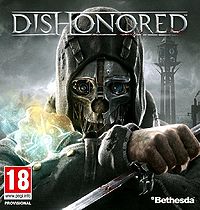
| |||||||||
| Developer | Arkane Studios | ||||||||
| Publisher | Bethesda Softworks | ||||||||
| Platform(s) | PlayStation 3, XBox 360, Windows | ||||||||
| Genres | Action role-playing game, stealth | ||||||||
| Rating(s) |
| ||||||||
| Available From | |||||||||
…Dishonored… You do know the British came first, right, Arkane? I don't care if that's what you title it in your own weirdo land of grease and white supremacy, but here in the paradise of crocs and beady hats we expect the correct British spelling. It's not like it's that hard to add the extra 'o' to the box-art; sure it'll cost you a bit of extra dosh, but you should've thought about that before you chose a name with two different English spellings. I always get bothered by this sort of regional naming since it always feels like my very existence is being called into question.
Whatever, Dishonored… ugh, that feels dirty… is an action role-playing game set in the ruined city of Dunwall, unique to all those other ruined cities for being steampunk. You play as the faceless, voiceless man with horrendous dress sense named Corvo Attano, the most trusted bodyguard of the empress before she almost immediately gets assassinated and her daughter gets kidnapped. Good luck at the next employee evaluation, Corvo! Anyway, he's framed for her death, but escapes the prison with help from a morally dubious resistance group who assist him to take his revenge, rescue the empress' daughter, and restore stability to the region. Except there's also a massive rat plague spreading across the country that threatens to kill everyone anyway, and no one bothers to ponder that Corvo may be a bit unhinged and trigger-happy from this experience, so I can't help but feel everyone in this game are simply failing to see the forest through all the toxic mutant trees.
Those of you actually care for what I have to say in this newsletter know that I bashed the E3 trailer of Dishonored for failing to explain anything about the game beyond being a gleeful murderfest, and while the game most certainly is that it's also a whole lot of other things, namely Thief and BioShock. OK that's not completely fair; it's also Deus Ex as well. Seriously, though, Dishonored resembles a Frankenstein of ideas from other popular releases, which normally I would reprimand or call unoriginal but in this case it actually works. It's like mixing a good cocktail; drinking each ingredient on its own is all well and good but it takes true skill to blend them all together into a concoction that tastes just as swell, if not even better, and I'll be damned if Arkane can't make a damn good drink.
It really does seem like Arkane spied on me and just took all the best parts of every game I love more than a giant ribbon-shaped pavlova. On full display are the sprawling, open-ended levels of Thief 2 that always give me a great big hard-on, each level with a rich variety in the paths and options of progressing and accomplishing all the missions that Deus Ex did before the sequels discovered that was too fun for anyone to bear. There's a somewhat unbalanced power-up system akin to BioShock wherein you collect ancient arcane runes to acquire magic powers of your choosing, ranging from an invisible dash move, to a berserker skill, to stopping time to give generically evil policeman wedgies.
Among the many strategies you can employ entail sneaking across the rooftops or sewers (both good ways to get yourself covered in shit), possessing fishes, dogs, or other people to sneak by guards and security systems, mercilessly slaughtering everyone with a stupider mask than you, or summoning a swarm of hungry rats to eat everything in their path like a serial killer pied piper. I of course went for the stealthy no-kill run, me being the incredible pussy I am, and the game pleasantly avoids the System Shock or Deus Ex: Human Revolution mistake of forcing you into combat-only boss fights; Dishonored doesn't really have boss fights so much as boss targets, as each level generally has one or two specific assassination targets that you can bring down in a variety of ways, whether that be through brute force, careful espionage, or even just revealing incriminating evidence on them.
While I'm mindlessly praising the game for encompassing all of my game fetishes, the Empire of the Isles has got to be one of the most detailed worlds I've ever seen in a recent triple-A video game. It was about the eighth book I nicked from some crazed survivors house that I realised a tremendous degree of effort and detail rarely seen outside of toy train factories was invested into making the Empire of Isles feel rich and teeming with life. There are clear definitions of the societal, political, and even economic structures of the empire; you can collect maps detailing all the other locations in the isles you'll never be able to visit; and several books follow the progression of the rat plague and the political unrest leading up to the current events. This is pretty much the standard for Bethesda games, sure, but here it's actually presented in a manner easily understood for people who don't have 100 hours of cheeto-fueled delight every week to invest into reading every last bit of literature in the game.
Just so I don't completely spoil that Dishonored will be in my top five games of the year list, and to maintain journalistic integrity so it doesn't seem like I'm ignoring the bad on the count of the game catering to everything I like in my video games, let's actually get to the negative criticism. The game is certainly way too easy, quick-save being readily available to you if you have to sneak past a steam-powered AT-ST or are a complete wimp, and all the guards seem to have been trained at FOXHOUND since they're always too quick to dismiss any suspicious activity as the result of wind or rats even whilst knowing a highly trained supernatural assassin is on the loose. The nature of the upgrade system somewhat shoots specialisation in the leg since it's not hard to find runes, and the rat swarm skill is overpowered as shit and just plain awesome so most people will probably just wind up abusing that, although that was a strategy far beneath my crafty, boring roof-climbing brilliance.
While the story may not be anything special at its meaty centre, it's paced and presented well enough to maintain interest which makes it a mighty shame that the characterisation dressings were made from grime and cow urine. Virtually every single character only ever spouts exposition to link one mission to the next without so much as a comment on the weather to liven the conversation up, all whilst glaring at Corvo through Bethesda's typical terrifying fixed eye contact, like they're all Barbie dolls being controlled by the universe's biggest asshole of a god. While I understand the city has become quite dreary since those good ol’ days, that shouldn't mean the people need to be dreary as well. If not for my own personal adoration for stealth and the knowledge that there was a good ending and a bad ending dependent on how much of a big murdering bastard Corvo was, I probably would've just killed all the guards just to stop their repetitive blithering because none of them have any personality or charm that would otherwise incentivise seeking out passive means to progress.
So Dishonored has the gameplay and world-construction depth I like, but it just can't seem to get characterisation right. And that's a pretty big fucking problem considering how story-driven the game is, especially when your protagonist can't speak. How much of the conflict in this story could've been solved had Corvo just explained what actually happened and offered to help correct the problem? He wouldn't even necessarily have to speak to do that; he could've just written it all on a piece of paper and saved a lot of guards their nasty headaches. But hey, a good game is a good game, and it's great to have another open-ended stealth experience again after so many years. Kudos to you, Dishonored, for filling in a gap that's long needed to be refilled again! Now fuck off while I play Assassin's Creed III.
Caiman Gamin'
So for an introduction I was going to write a little about a certain topic that's been bugging me a lot these past few days, but it ended up being way too long so I decided to just make it another section, but…you'll see that one later.
Anyway, on to the review of the game I said I was gonna review, what, three months ago? Y'see, I actually completed Mass Effect 3 more or less when I was doing the other two reviews, BUT, I couldn't find any time to actually gather my thoughts and make a coherent review about it. And, in order to make this review, I had to replay like 1/3ths of the campaign so that this isn't based on LIES and BLASPHEMY. Still, that replay was made in the last days of September, and the review was done by October. So, you're probably wondering, why did I withhold the review from you people? Well, the Wii U version of Mass Effect 3 is coming out this month (actually, by the time this is published the game will probably be already out), and I figured most of the people who would buy this game are getting that version, so that's that.
So, just in case you forgot, I'm going to review Mass Effect for the Playstation 3, Xbox 360, Wii U and PC, developed by Bioware and released March 6, 2012. This review is based on the PC version of the game downloaded though Origin, and is solely focused on the single-player aspect of the game, simply because the multiplayer takes like 10 days to load to the title screen.
Starting with most likely the reason you would play a Bioware game, the story. This is probably the only time I didn't like the story in a BioWare game, so let me explain why. The Reapers are invading the Earth and everything in the Milky Way because fuck humans and aliens, that's why. So Commander Shepard, who was in jail because nobody will pay attention to what he/you have to say because they're a bunch of idiots, gets out of Earth quickly, gets his old squad back plus some Latin dudebro nobody asked for and they are off to make sure the aliens stop fighting against themselves and start trying to "prevent the end of civilization", because if Shepard didn’t exist nobody would get anything done.
Why does this piss me off so much, if it sounds like standard sci-fi adventure crap? Well, in the second mission you're introduced to the "deus ex machina" of the series, an old and ancient weapon that has just been discovered called the Crucible that can somehow destroy the Reapers in one fell swoop because science! So, you thought this game was gonna be all awesome and shit with you going forming alliances between humans and alien races, going to their homeworlds and killing Reapers, while at the same time having the ultimate goal of getting back Earth? NOPE! All the game you spend time getting resources for the Crucible, in the meantime getting like 2 of the hundreds of subplots in the series resolved. I do have to admit there are some cool moments in the story, but as a whole it just feels like BioWare didn't really know how to end it so they just made up shit thinking we wouldn't care.
That's not even going into the character dynamics this time. Instead of having private conversations with each of your teammates whenever you want, they'll only say one sentence to you except for scripted events, making the whole situation a whole step down from previous games.
The other important thing in a BioWare game is gameplay, right? Well… I really don't have a lot to say about it, because it's the same fucking thing every level. I mean it; every level is just SHOOT WAVE OF ENEMIES, GO TO NEXT AREA, and SHOOT NEXT WAVE OF ENEMIES. Now, this was fine for the other two games, because there were actually other interesting things to do in the game, but this time, there's only one hub for the whole game, The Citadel, but don't think that since there's only one hub, it's the most detailed area of the game. I'm pretty sure the Mass Effect 1 Citadel was more detailed and developed, and that game had four hubs! Four! And the only thing you can do in there anyway is to eavesdrop on conversations so you can go do side missions.
But don't think those side missions are something playable, though. They consist of going to the galaxy map and scanning a certain planet and… that's it, mission complete. The only challenge is the fact that the game forces you to not use the scan function too much because Reapers will suddenly appear on the map and won't leave that part of the galaxy until a day later in real time (note: I actually don't know what causes the Reapers to leave, but I assume it's just a fuckton of time.)
The music and graphics are fine, I guess, but that won't matter if the game isn't any good, right? Well, you're right, because at the time of writing I honestly can't remember any music at all; all that's stuck in my mind is the fact that this game is really bad.
So, to conclude with this... review (even though it was mostly anger management class), I'll say that, be it the PS3/360/PC version you're getting to complete the trilogy, or getting a game for your brand new Wii U of a franchise you were interested but could never try out, you're better off not playing this game, because, I swear to Clippy, its lack of payoff and baffling design decisions will end up ruining the rest of the trilogy for you. You'll go "meh, why bother if I already know the disappointing payoff?" and don't muster enough strength to play again. I hope the hypothetical (I know this is supposed to be the end of the trilogy, but you and I both know that a franchise so popular as Mass Effect will continue) Mass Effect 4 will go back and take the best of Mass Effect 2's gameplay BUT with the exploration and characterization of the first game, because that would honestly be the only way I would be interested in it.
Dippy's Matilda
Hey guys, it's your sub-team director again, with a subject I've been waiting several months to write about; Non-Combat Games. It's something I was going to write to coincide with my Prototype 2 review, but I wanted to do that sarcastic E3 article instead so decided to put it off, but now I think I have a good opening to discuss this so let's take a crack at it.
Games are violent and packed with action. So are many movies, books, and television, sure, but video games seem to be particularly bad in this regard. Almost every hugely popular game or series of the past twenty years has involved action, violence, or combat in one way or another, and that's understandable; as humans, we naturally find violence entertaining and fun, especially if it's on fictional avatars that don't exist. And there's nothing inherently wrong with combat games at all, in the same way there's nothing wrong with a good action film. But I think it's fairly hard to deny that the industry is overflowing with combat-focussed titles, from Mario's light-hearted stomping and fireballing of large turtles, to Kratos' brutal dismemberment of Greek deities; a quick look through your game collection will probably yield less genre variety than your film or book collection.
So why is this industry so geared towards combat, to such a degree that even Kirby isn't able to avoid harming other creatures? Simply put, combat is easy to make, understand, and sell; something attempting to harm you creates challenge, their attempts at harming you gives you context to harm them, and overcoming the obstacle creates a sense of accomplishment. There's no deep art to it, it's simply a formula that we've long since known to just work for creating conflict and entertainment, and that's a totally acceptable algorithm. I'm not saying we should abandon that for all games, not at all, the reason it gets used so often is because it just works for a lot of settings and scenarios.
But with people – both developers and consumers – still clinging on to the logic that games are just light-hearted recreation akin to toys rather than interactive art, there's not really much reason for most developers to deviate from combat games especially when it tends to limit broad appeal and sales, and often gets you branded pretentious or casual. But I always like to think of it in this context; could you imagine if every movie was a careless, fun summer blockbuster like Transformers, The Avengers, or Bourne? Sure, they may be fun action films that you can lose yourself in just to unwind, some might even be deep and interesting beyond the immediate flash and thrill, but they would become incredibly stale and bland if that's all we're being subjected to every time a new release comes out. Explode-y action fun isn't all there is to life, after all.
I guess the base argument here is we need more variety in our games, but it goes deeper than that. What could possibly make a game about negotiating or debating, or about constructing a town or city and maintaining it as mayor, be less engaging than a game where you slice living things up or crush them under your shoes? Where in the game development rules does it say a game about romance or character interactions alone couldn't be as interesting as casting fire and lightning spells on orcs? Why are these non-combat themes so rarely explored as full interactive triple-A games, instead delegated primarily to indie development teams without the sustainable budget to really flesh out these experiences to something with more substance?
That's not to say non-combat games don't exist, that would be a tremendously foolish statement. Some have even become huge successes, like The Sims and Guitar Hero, even if these games are just simulators instead of story or theme-driven interactive experiences. But that success tends to be used as an example in utterly baffling rhetoric for why they only appeal to casual non-gamers just trying to waste time, rather than being any legitimate gaming experience; in fact, in general it seems almost every time a game doesn't feature any sort of combat they get pinned as casual, niche appeal, or just pretentious indie crap. That is a terrible logic to have. Dismissing anything that you don't personally like under a derisive category just so you can pretend they don't exist or don't count is the very reason people still think of this medium as childish, non-inclusive, and stuck in its own world, and this closed-minded attitude is why games aren't evolving as steadily as they probably should.
Think about this year's indie darling Journey, a game I and several more professional critics gave a very positive review. Journey – as well as its predecessors FLOW and Flower – feature no combat whatsoever, no semblance of malicious action on your part. Sure, Journey does have monsters you need to hide from, but you never attack them; all you do is travel through a variety of locations in a large, strange world with another online player whose details are completely unknown to you. No name, no voice, no way to interact with them on a conventional level, all that matters is that they are another person in a land that's seemingly barren and empty, and that's enough to make your limited interactions with them so full of meaning and purpose. No fighting, no harming others, and yet still one of the most emotional, engaging experiences in the entire history of the medium. Why can't we have more major releases – especially big budget ones – that are so emotionally profound without having to use combat as the conduit through which we get engaged?
Imagine a role-playing game where the battle sequences are political debates and the popularity you gain allows you to pour experience into political-inspired stats instead of the usual fantasy stats? Or taking control of William Wilberforce in his endeavours to end the slave trade in the British Empire, viciously arguing in the court room while partaking in direct activism to garner support for the cause? How about a game where you travel around the entire world seeking your one true love, along the way taking part in a variety of different events and experiences across many different cultures? Imagine the rhythm genre being reborn as something more deep and story-focussed, as you take the role of a real musician – say, Johnny Cash or Eric Clapton – in a detailed biopic of their lives? And these are just a few ideas from one idealistic gamer; what might happen if an entire company of professional, devoted developers were conceptualising deep and emotional gaming experiences that don't employ combat at all to engage its audience? The possibilities are endless!
I know it can seem a bit scary to make such a radical change to the way we approach serious game design, and almost as if what's made the medium so entertaining and appealing to us could be taken away, but this industry will never mature if everyone just refuses to accept change, however bizarre or uncertain that change may seem. Admitting that games could explore other aspects of the human condition without requiring inflicting pain on other things or fast-paced action at all times to keep it interesting, isn't going to ruin the medium for anyone; the action games – both the carefree fun ones and the story-driven ones – will always still be there as they should, and they may always be the dominant force in the industry, and there's nothing wrong with that at all. We'll just have a whole new pool of interactive experiences to dive into and completely immerse ourselves – and hopefully more people who otherwise wouldn't spend that much time on video games – in.
Maybe many of the examples currently out there aren't quite up to scratch – I mean Ace Attorney is engaging as hell, but it's still a bit low on the interactivity side – but we'll never make progress if we don't start somewhere, even if we're not going to get it right the first time. Rather than looking at these games as sloppy, pretentious, and unengaging, we should maintain an open mind and observe them; think “well this isn't brilliant, but how could it be brilliant? How could we take inspiration from this to make it work in the future?” Once we start thinking that deeply about game design, thinking outside the box of the accepted status quo of combat games into new, unexplored realms of player engagement, I think you'll find we'll have a much more rich, varied, and exciting medium! Hopefully this was interesting, and I'll see you again next month!

